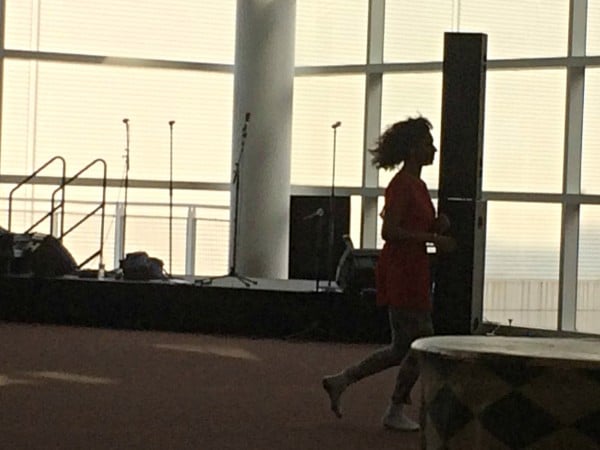Sunday morning, at Jubliee, I sat on the floor of a conference room named Butler West. It was the first time, in more than a year, I’d been in a room with that many people who look like me. Khadija Adams was the presenter, her workshop title, The Best of Times the Worst of Times: Life as a Black Christian on a White Campus. Sitting on the floor, listening to her, I couldn’t take notes fast enough. It’s been a long time since I’ve set foot on a college campus, but the story hasn’t changed much, it would seem.
This may be 2014, but white students are still asking their black college roommates questions about their hair and, when two black students happen to cross paths on campus, a silent nod is still exchanged between the two—a sign of solidarity in what, for some, is a strange, new world.
“Have you seen Twelve Years a Slave?” Khadija asked, at the end of the workshop. Most of the students shook their heads. No, they hadn’t seen it. Paying to see a movie in the theater is not on the top of the list of activities for students whose lives revolve around term papers and finals and dinners of Ramen Noodles.
I haven’t seen it, either. I’m not ready for the gut punch it’s sure to deliver.
Last year, I made a commitment not to participate in Christian conferences with no people of color included in the line-up of speakers, the planning team, or in the pictures on the pages of the web site. Because. There really is no excuse. Whatever you just thought of? Break it down. Sit with it for a minute.
It’s really not an excuse.
We have held on to our “reasons” for far too long.
I don’t mean to step on your toes. I don’t. I also don’t mean to give anyone any ammunition. I’m not into that, either. I am simply telling you I don’t think it should be a pleasant surprise for me to find myself sitting in a room of people who look like me, while attending a Christian conference.
Of all the Christian conferences I’ve ever attended (excluding those in my denomination), Jubilee seems to have the most traction when it comes to figuring out this cross-cultural thing. This conference was so diverse, there was no need to try to determine percentages. Every nation, every generation, every culture. Right there in one place, for an entire weekend, worshipping one God. I would describe it to you, but my words can’t do it justice. Suffice it to say, we are without excuse.
One night at Jubliee, I sat chatting with a friend I’d met last year at Q. She said, “It’s not just that they have the different races represented here, they have weaved the cultures in to the event.” Exactly.
One temptation, when working toward a diverse experience in the church, is to simply fill a role with a person of color, but expect that person to do things the way the dominant culture does them. So, you end up with white people in robes, swaying with a mostly black gospel choir. Or, you find one or two black people, rocking out to the electric guitar with a mega-church praise band. Now. Hold on, before you hear me incorrectly. For some white people, the black gospel choir is their thing. And, for some black people (like my husband), Jimi Hendrix is their go-to guy. That’s not what I’m talking about. What I’m talking about is a failure to represent the cultures, stories, and experiences present in the room. Or, to represent them in a way that is stereotypical.
We can do better. And, lest we think we can just hold on to the way we’ve always done things, let me warn you there is a change in the air. Those students who attended Jubilee are not your typical we’ve-never-done-it-that-way Christians. We worry about keeping the next generation in church, but then we hold on to our excuses. We cannot have both. They won’t stand for it. The young Christians I worshipped with last weekend are looking the Church in the eye and shouting to us that our excuses no longer hold water. The walls won’t hold. The lines are being erased beneath their feet. They’ll accept the torch from us, as we pass it to their generation. What they won’t accept is our excuses.
